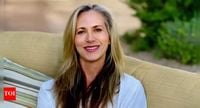In the ever-evolving landscape of health and wellness, the quest for longevity has captured the imagination of many, leading to a surge in reverse aging trends. Among those making headlines is Julie Clark, a 56-year-old woman whose biological age reportedly stands at just 36. Clark's approach to aging has gained significant attention, especially in contrast to the more expensive and complex regimen of Bryan Johnson, a well-known entrepreneur who spends around $2 million annually on his anti-aging process.
On April 15, 2025, health researcher Craig Brockie shared Clark's remarkable story on social media, highlighting her affordable reverse aging routine, which costs only $4 a day. Brockie noted that Clark has been ranked #2 on the global longevity board, a testament to her innovative methods.
Clark's daily routine is a blend of discipline and simplicity. She rises early, between 4 and 5 AM, during the week, engaging in calming activities such as reading and meditating before heading to the gym. On weekends, however, she allows herself to enjoy a more relaxed schedule, free from alarms and commitments, focusing on her mental and physical well-being.
Physical activity plays a crucial role in Clark's routine. She trains six days a week, dividing her workouts into three days of weightlifting and three days of cardio. Her strength training includes compound movements like Romanian deadlifts and split squats. During cardio sessions, she practices Zone 2 training, maintaining her heart rate between 60-70% of its maximum. To cap off her workouts, she enjoys a 20-30 minute sauna session followed by a brisk 5-minute cold shower.
Diet is another cornerstone of Clark's regimen. Instead of counting calories, she focuses on the quality of her food intake, ensuring she consumes at least 1 pound of vegetables daily, with half being leafy greens, alongside 100 grams of protein. Her meals typically include a breakfast of moringa, fermented greens, collagen, and maca; a lunch of vegetables paired with eggs or meat; and a dinner featuring steak, greens, or sardines.
While many biohackers indulge in a plethora of supplements, Clark keeps her intake minimal, opting for a select few: B-complex, fish oil, probiotics, magnesium, Vitamin D3 + K2, inositol, apigenin, and L-theanine.
Sleep is equally prioritized in her routine. Clark aims to be in bed by 8 PM and asleep by 8:30 PM, often taking a long walk of 6-9K steps an hour before bedtime, accompanied by calming music. This winding down period includes light stretching and personal care rituals.
Clark's rise to fame has sparked interest in the broader concept of reverse aging, which involves slowing down biological aging and the physiological changes associated with it. Although complete reversal remains elusive, researchers are exploring various interventions at cellular and molecular levels to potentially mitigate age-related changes. Many individuals, like Clark, are now focusing on their biological age—the health and functionality of their body's systems—through lifestyle changes and targeted treatments.
In stark contrast to Clark's accessible approach, Bryan Johnson, 47, has been a prominent figure in the longevity movement, especially after the release of Netflix's documentary, "Don’t Die: The Man Who Wants To Live Forever," in 2025. Johnson's regimen is rigorous, involving a strict vegan diet, extensive supplement intake, and daily health monitoring. He wakes at 5 AM, having ensured he gets precisely seven hours and 44 minutes of sleep, and follows a meticulously structured day.
Johnson's routine includes a one-hour workout, measuring various biomarkers, and a 90-minute hyperbaric oxygen therapy session. His diet consists of lentils and salads, with every ingredient tested for contaminants. He has notably reduced his supplement intake from 110 to 40 daily pills, emphasizing high-quality sleep as essential to his well-being.
Despite his extreme measures, Johnson's methods have drawn both admiration and criticism. He made headlines in 2023 when he revealed he had undergone a plasma transfusion from his teenage son, Talmage, as part of his biological age reversal experiments. His controversial practices, including tweeting a list of 10 expectations for potential romantic partners—such as 'no pillow talk' and 'scheduled sex'—have further fueled public intrigue.
Johnson's ambition to extend human life has placed him at the center of a cultural phenomenon, particularly as he mingles with Hollywood elites. He was recently spotted at Paris Hilton's 44th birthday party alongside celebrities like Jessica Alba and Kim Kardashian, further solidifying his status as a viral sensation.
In discussing his quest for longevity, Johnson noted, "A lot of people really don’t want to die. I get a lot of hate, but just as many people are deeply interested – people who want to look great, feel great, be great." His assertion that he has reduced his aging speed to 0.64—meaning he ages only seven and a half months for every year—highlights the extreme nature of his pursuits.
As the debate around the ethics and feasibility of such extreme longevity practices continues, Clark's more accessible methods present a compelling alternative for those seeking to enhance their health without the hefty price tag. Her story emphasizes that significant lifestyle changes can yield impressive results, even without the backing of substantial financial resources.
Ultimately, the fascination with aging and longevity reflects a broader societal desire to maintain vitality and well-being as we age. Whether through Clark's affordable strategies or Johnson's extravagant pursuits, the conversation about how to age gracefully and healthily is more relevant than ever.



